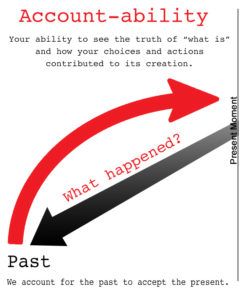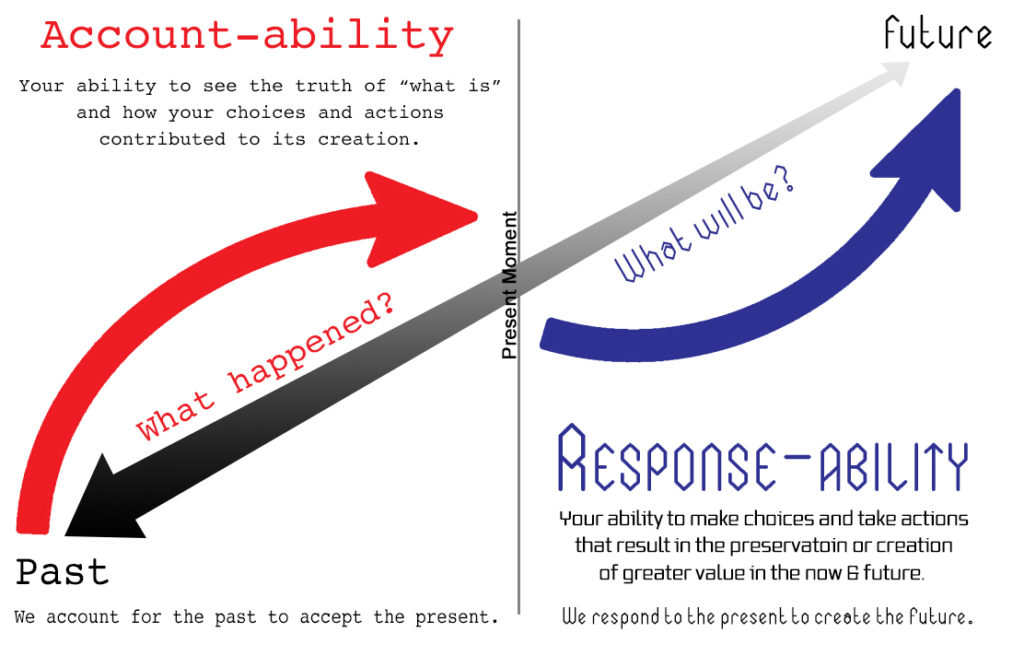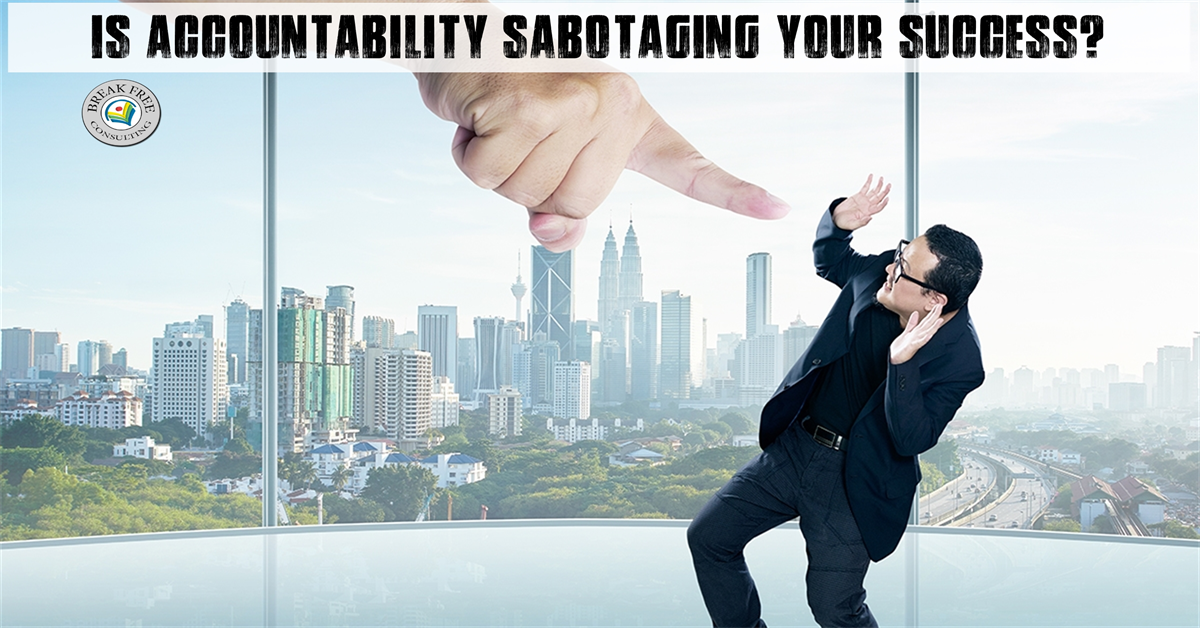So, you want a culture of accountability, huh?
This has been a trend lately in our culture. Just look at how the use of this word has exploded over the past 40 years.

Many folks think a culture of accountability is a workplace full of people who “own” their work. In truth, accountability is only half of the equation of what leads to “ownership” of work. Only holding people accountable is a losing proposition. Why?
Accountability
What is accountability? Well, the dictionary says that it is “subject to the obligation to report, explain, or justify something.” Now, if you are going to report on something, in which direction are you looking?

Well, where does your ACCOUNTant look? Does she look in the future or in the past? An accountant is a person who looks back into the past at the income and expenses that you had over a period of time and accounts for where the money is or went. The accountant does not (typically) help you plan for your future and look forward. You’d hire another financial professional that does that.
 Accountability has us focused on the image in the rearview mirror. When we are focusing on what’s in the mirror, we are missing the opportunities that lie ahead of us. Accountability has us analyzing the bumps in the road that we’ve already passed. Is there value in that? Sure.
Accountability has us focused on the image in the rearview mirror. When we are focusing on what’s in the mirror, we are missing the opportunities that lie ahead of us. Accountability has us analyzing the bumps in the road that we’ve already passed. Is there value in that? Sure.
Looking Back
Yet, a constant focus on accountability causes folks to use the rearview mirror more. The rearview mirror narrows your perspective. You can fail to see the options and choices that may be present as you travel along the road. With this narrow perspective, you can feel trapped. You can feel that even as you’re moving forward you better CYA (cover your assets). This causes otherwise intelligent, hard-working, determined human beings to go into states of fear because of the impending and often incessant pressure of accountability.
Under this threat, you will see folks act with behaviors that are exactly the opposite of what is desired. Behaviors like:
|
|
Do these types of responses lead to improved performance? No, not consistently. Maybe these can help in a short-term, acute situation, but overall these behaviors negatively impact the performance of the team.
With accountability, the focus is on the “should.” You should follow this process. You should complete this task. You should talk to people. You should follow the policies and procedures for every part of your job. You end up with “should” all over the workplace. Top performers don’t want to work in a “shouldy” environment or follow a “shouldy” leader.
So what’s missing?
Responsibility
Leaders must foster an environment of RESPONSIBILITY!
Now, are we saying to never look back? Of course not. Great lessons can be learned. However, much like the previous picture of the rearview mirror, the time spent looking back is small compared to the looking forward, moving forward part of the bigger picture.
To be responsible means that you are looking at where you are in the present moment and responding. Responsibility is about using what you know and what you perceive to make best choice and generate the greatest value. In this present moment, there is no need for blame, shame, denial, anger, embarrassment or justifications. What is simply is and you are responding to that reality.

“You must be present to win!”
There is so much truth in that statement and we aren’t just talking about a raffle or prize giveaway. Response-ability is your ability to make choices and take actions that will result in the creation of greater value. Responsibility is focused on “what is” and “what will be.”
Think about it… Would you rather have a team of accountable people? People who are always looking backward? (Mainly focused on covering their bums.) Or, would you want to have a team of responsible people? Those who will focus on the future and how they can take actions to make the biggest difference in the world?
It’s takes a blend. You want to spend a short amount of time accounting for the past in order to accept the present. In this form of accounting, there is no blaming, shaming or gaming. You are simply looking at what happened to get you where you are and focusing on how you can use that data and information to plan a better path forward and take actions that lead to better results and success. You want to spend the majority of your time responding to the present to create the future you desire.
The best leaders focus on responsibility more than accountability. More specifically, they focus on teaching their team how to TAKE responsibility not just BE responsible.
What’s the difference?
Being Responsible
Folks who are being responsible are doing so because it’s expected from outside “forces.” They have to, should and must do what they do because “being responsible” is what good people do.
They’ve been taught to keep your elbows off the table, be nice, good girls eat their peas, good boys don’t cry, don’t cheat, go to college, raise a family, pay your taxes, donate money, etc. The list goes on and on.
It can also vary slightly depending upon the culture or society as there may be additional items on the “being responsible list” like a devotion to God, intolerance for “sin”, loyalty to the family, fight or die for the cause, defeat the infidels. These aren’t just expectations of ISIS, they can be said of other religious and political organizations across the globe.
There are lots of list of behaviors and actions you must take to be responsible: say you’re sorry, stay in line, don’t make a scene, don’t disappoint others, respect your elders. And then if you happen to NOT be responsible: you should be ashamed, you should be embarrassed, you should feel guilty… none of these lead to TAKING responsibility. They simply lead to an oppressive life of obligation where folks feel stuck, disempowered, and unfree. Being responsible means acting acceptably in the eyes of others. It means seeking and receiving approval for conforming to set expectations.
Please don’t misunderstand… there is nothing inherently wrong with being responsible. So, let’s look at the difference between being responsible and taking responsibility and you be the judge…
Taking Responsibility
Taking responsibility is vastly different. When you take responsibility, you see yourself as a causal force with power, freedom, wisdom, and choice. You have the ability to decide how to act and respond to the circumstances in your life.
Being responsible is a commitment to being good and doing right (even if you are miserable when doing so). Taking responsibility is a commitment to own your life, to self-leadership, growth, and freedom.
· Dr. Christopher Avery, The Responsibility Process ©2016
Taking responsibility is not about saying “It’s my fault,” “My bad,” or “I’m to blame.” It’s more than that. Taking responsibility is about seeing yourself as a chooser, problem solver, agent, and learner in your life so you can integrate with the environment around you in a powerful and fulfilling way.
A “responsible” person is one who can be trusted to consistently respond to situations in ways that generate greater net value.
A big part of accountability is the willingness, and even insistence, on getting to, accepting, and expressing the real “truth” of things. Highly accountable and responsible people relish the truth because they know that the truth is what sets them free—free to make good choices; free to achieve and grow; free from the baggage and stress of dealing with their misperceptions, conflicts, and unrealistic expectations and attachments.
“Your past is not your potential.
In any hour, you can choose to liberate the future.”~ Marilyn Ferguson
Ownership
Ownership, true ownership, takes both accountability and responsibility.
Accountability in the sense of taking an account… not looking to blame or justify or shame.
What would happen if we focused on a “responsibility or ownership culture”? What if we acknowledged the past and expressed the truth, taking into account our past experiences without the need to blame, shame, or justify? What if we focused our attention on the response, on the behaviors, and actions we’d like to see to produce the results we desire?
What if as leaders, we taught our team how to TAKE responsibility?
You see, we can! There is a process to taking responsibility.
Anyone can learn this. Would you like to learn more? Here are three terrific resources for you.
- Listen to our Project Management for the Masses podcast where Cesar and I talk with the expert on The Responsibility Process™, Christopher Avery, PhD. We will discuss the 5 mental states that everyone goes through when falling short of expectations and how it is necessary to pass through those states in order to TAKE responsibility.
- Christopher Avery has written a book that details The Responsibility Process. This book gives you precision tools, practices, and leadership truths to navigate The Responsibility Process™ and lead yourself and others to freedom, power, and choice.
- Learn more from the master himself in The Leadership Gift program. This is an online learning program of which I have been a student and loved it. Unlike anecdotal approaches to leadership development and change, Christopher’s approach derives from 27 years of field studies with leaders revealing a little-known pattern in the mind that regulates whether we cope with problems or blast through them and grow.
Disclosure: Please note that some of the links above are affiliate links, and at no additional cost to you, I may earn a commission if you decide to make a purchase after clicking through the link. Please understand that this isn’t about me making money. I have experienced all of these products. I recommend them because they are helpful and useful and life-changing, not because of the small commissions I make if you decide to buy something through my links. Please do not spend any money on these products unless you feel you can benefit from them.
